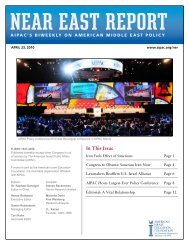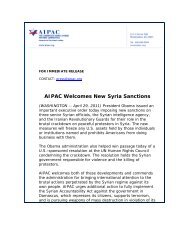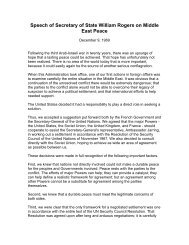2013 Briefing Book - Print Version - Aipac
2013 Briefing Book - Print Version - Aipac
2013 Briefing Book - Print Version - Aipac
Create successful ePaper yourself
Turn your PDF publications into a flip-book with our unique Google optimized e-Paper software.
IRAN<br />
What Congress Has Done to Oppose Iran’s<br />
Human Rights Violations<br />
Condemned and Sanctioned Iranian Human Rights Violators. During the past 30<br />
years, Congress has passed dozens of resolutions condemning systematic human<br />
rights violations and the denial of basic freedoms in Iran. In 2010, as part of the<br />
Comprehensive Iran Sanctions, Accountability and Divestment Act (CISADA),<br />
Congress for the first time mandated sanctions against individuals responsible for<br />
the massive human rights abuses and government crackdown following the 2009<br />
election. The Obama administration has sanctioned multiple Iranian officials,<br />
including the commander of the Islamic Revolutionary Guards Corps and the<br />
minister of intelligence. The 2012 Iran Threat Reduction Act also called for sanctions<br />
on individuals responsible for human rights abuses against Iranian citizens following<br />
the 2009 elections and on persons who engage in censorship or related activities<br />
against citizens of Iran.<br />
Urged Greater Scrutiny of Repression in Iran. Congress has also urged the administration<br />
and the international community to put greater diplomatic emphasis on Iranian human<br />
rights violations. Congress has supported the U.S.-led efforts in the United Nations<br />
to condemn Iran’s record. Every year for the past seven years, the General Assembly<br />
has passed a resolution sponsored by the United States and Canada condemning the<br />
“serious ongoing and recurring human rights violations” in Iran.<br />
Provided Funding for Democracy Activists. Beginning with the fiscal year 2004<br />
appropriations bill, Congress has provided financial support for the promotion of<br />
democracy in Iran. During the past eight years, more than $50 million has been<br />
appropriated for such efforts. In 2006, Congress passed the Iran Freedom Support<br />
Act, which declared that the policy of the United States should be to support human<br />
rights and democracy promotion in Iran.<br />
Supported Media and Internet Freedom in Iran. Congress placed greater focus on<br />
Internet technology as the Iranian regime increased censorship and attacked new<br />
media to prevent the flow of information and ideas. In February 2010, at the urging<br />
of Congress, the administration provided licenses to export anti-censorship software<br />
to Iranian democracy activists. As part of CISADA, Congress also prohibited<br />
government contracts to any company that provides the regime with technology used<br />
to monitor and restrict free speech.<br />
136








